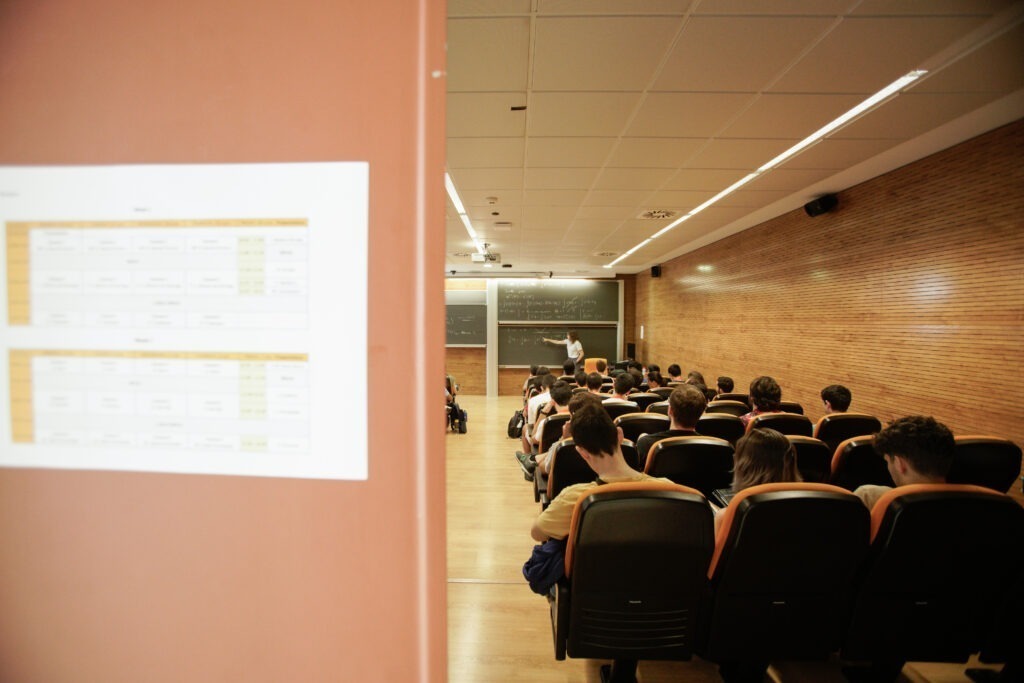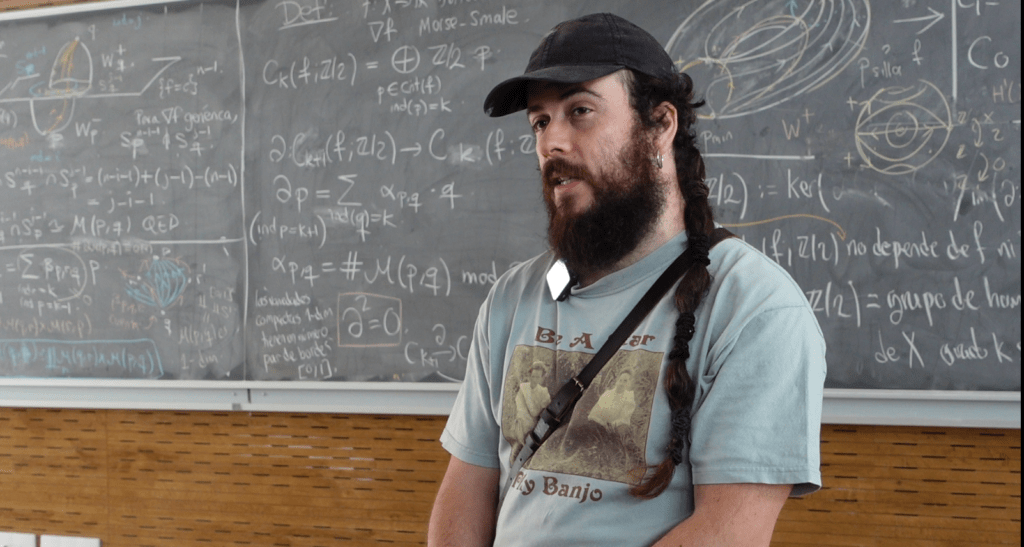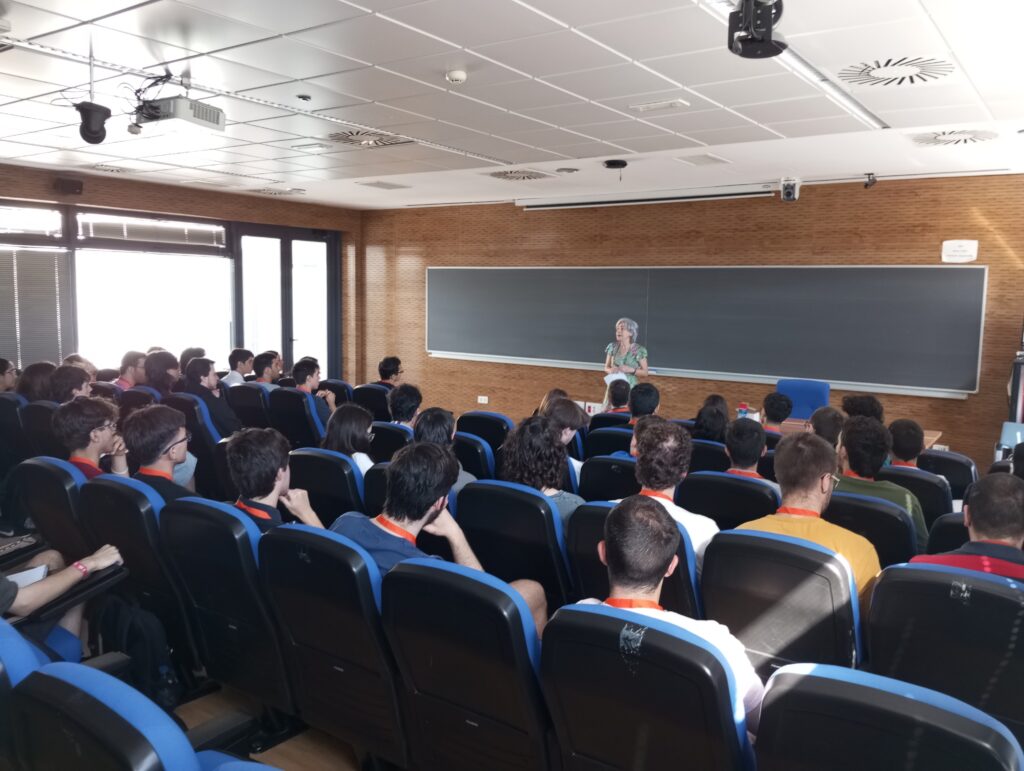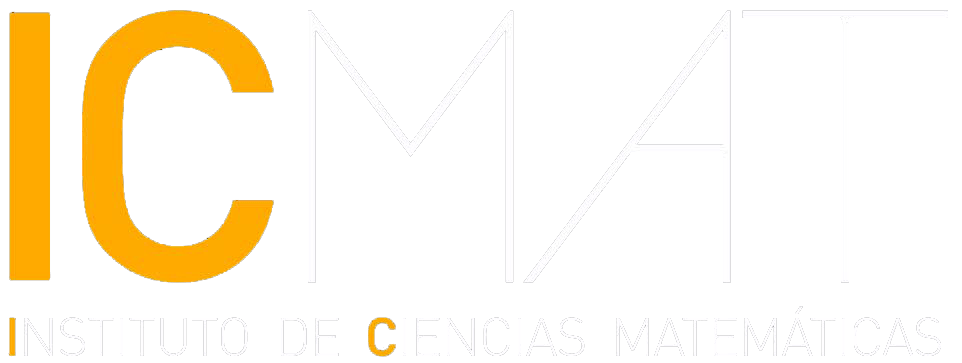
The JAE School of Mathematics is held annually at ICMAT. Image: Iñigo de Amescua/ ICMAT
For two weeks, a hundred students in their final years of undergraduate and master’s degrees -mainly from Spain, but also from Peru, Ecuador, Mexico and the USA- attend the JAE School of Mathematics at the ICMAT. This year marks the 15th edition of this event, which offers students interested in an academic career the opportunity to learn about current research topics from the people working on them. Some of them were students at the School years ago, which shows its role as a breeding ground for researchers. “Hundreds of participants have passed through the school, some of whom have become renowned researchers in their respective fields,” says Javier Aramayona, director of the ICMAT. The School takes place from June 24 to July 5 in the ICMAT’s Aula Azul.
Ágata Timón García-Longoria (ICMAT)
As it does every summer, the ICMAT hosts its research initiation school for undergraduate and master’s degree students: the JAE School of Mathematics. “The ICMAT maintains a strong historical commitment to the training of young researchers. The JAE School, which this year celebrates its fifteenth edition, is one of our main educational projects: it aims to open a small window onto the world of research in mathematics,” says Javier Aramayona, director of the ICMAT.
From June 24 to July 5, this year’s program includes six mini-courses and five introductory talks on current research issues in a wide range of fields, from number theory to geometry, differential equations and algebra. The lectures are given by expert researchers in these fields, not only from ICMAT but also from other prestigious institutions such as the Massachusetts Institute of Technology (MIT, USA) or the Swiss Federal Institute of Technology in Zurich (ETH, Switzerland). Some of them, such as María Ángeles García-Ferrero (ICMAT-CSIC), Javier Fresán (Sorbonne University, France) and Daniel Álvarez-Gavela (MIT), were once students at the JAE School.
“That experience allowed me to get to know the ICMAT as an undergraduate student. It is an intermediate step between an undergraduate course and a research seminar. I was able to attend very interesting courses, including one given by Francisco Presas (ICMAT-CSIC) on the h-principle. I had a great time, and it awakened in me a little taste that has remained part of my mathematical career ever since,” says Álvarez-Gavela. Years later, he did his PhD at Stanford (USA) with Yakov Eliashberg, one of the fathers of the h-principle and winner of the BBVA Foundation Frontiers of Knowledge Award this year.

Daniel Álvarez-Gavela, now a researcher at MIT, attended the JAE School in one of its first editions.
Álvarez-Gavela, García-Ferrero and Fresán are examples of the role of the School as a quarry of mathematical research. “Throughout these years, hundreds of participants have passed through the school, some of whom have become renowned researchers in their respective fields,” says Aramayona.
This year 104 participants have enrolled – 90 of them attend the full program, the rest only one of the two weeks – with an interest in research in mathematics and its applications. All students who have applied have been admitted and attendance is free for all of them. Over the years, the School has also begun to attract students interested in mathematics from other places outside Madrid, or even from Spain. Although 60% of the students come from Madrid, this year 32% of the students are from other parts of Spain and 7% from universities in Mexico, Peru, Ecuador and the USA. Most of the students are studying for a degree in Mathematics (70% of the total), 11.5% for a double degree with mathematics and 15.4% for a master’s degree or doctorate. In addition, four high school students, winners of Mathematics Olympiads, participated in the school.
Among those attending the school, 25 of them are beneficiaries of the Severo Ochoa 2024 (INTRO-SO) grant program for introduction to research. In addition to participating in the courses and lectures, over the course of a month they have the opportunity to carry out a scientific project with an ICMAT researcher as a tutor. This is another step towards, perhaps, starting a scientific career.

Yesterday, June 24, the JAE School began in the Aula Azul of the ICMAT. Image: Nadia Velasco (ICMAT).
Two weeks of advanced mathematics
The six mini-courses -each of four 90-minute sessions- are ‘Parametrized Morse theory’, given by Daniel Álvarez-Gavela (MIT), ‘Periods’, by Javier Fresán (Sorbonne University), ‘Counting curves in hyperbolic surfaces’, by Juan Souto (University of Rennes, France), ‘Spectral geometry: eigenfunctions of the Laplacian and nodal sets’, by Alberto Enciso (ICMAT-CSIC), ‘Mostow’s Rigidity Theorem and bounded cohomology’, by Alessandra Iozzi (ETH), and ‘Stable solutions to nonlinear elliptic PDEs’, by Xavier Ros-Oton (ICREA and University of Barcelona).
In addition, there will be introductory talks on research topics by Ana Bravo (ICMAT-Universidad Autónoma de Madrid, UAM), Caterina Campagnolo (ICMAT-UAM), María Ángeles García Ferrero (ICMAT-CSIC), María Medina (ICMAT-UAM) and Luis Martínez Zoroa (University of Basel). In addition, as a novelty this year, on Wednesday July 3 at 15:30, there will be a round table on research careers in mathematics, with the participation of Iozzi, Ros-Oton, Martínez Zoroa and Alba García (ICMAT-CSIC), and moderated by Ágata Timón, coordinator of the Mathematical Culture Unit of the ICMAT. “The round table will provide an overview of the research career and its different stages. Through a dynamic dialogue with the speakers and questions from the audience, we will draw a small map of the research career, answering some common questions in the minds of students: how do I choose the topic of my thesis, what kind of funding is available, what happens after the PhD,” Aramayona explains.
The School is organized by Daniel Peralta-Salas, scientific researcher at the Consejo Superior de Investigaciones Científicas (CSIC) at the ICMAT, and Diego Córdoba, CSIC research professor at the ICMAT and director of the center’s Severo Ochoa program.
This content has been automatically translated. The original text may differ slightly.
